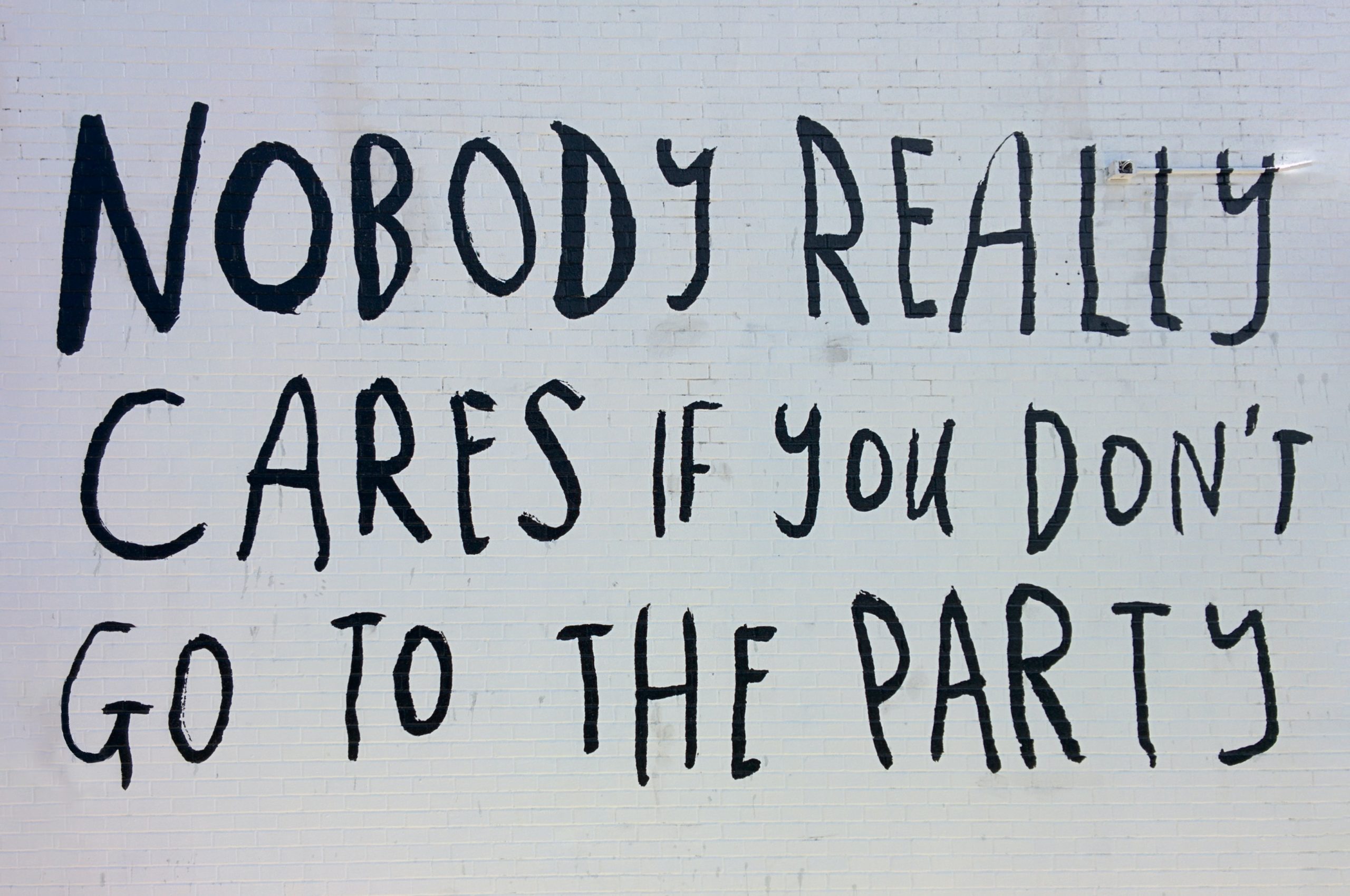
Friday evening, the pitter-patter of the rain drumming against the glass of the tram stop, a throbbing headache from the night before and the day behind you, as you encounter your friend. They rave about their plans for the evening and what they’ve been up to that day, ending the interaction with a “I can’t wait to see you tonight!”. A glimpse of recollection sparks across your mind – the bar-hopping plans you made earlier that week. You fantasize of the comfort of your bed, a warm meal and a moment to gather your thoughts. But what if you miss the night of your life? It’ll be worth it in the end, you think to yourself as you confirm your attendance and hop on the tram. Won’t it?
Friday evening, the pitter-patter of the rain drumming against the glass of the tram stop, a throbbing headache from the night before and the day behind you, as you encounter your friend. They rave about their plans for the evening and what they’ve been up to that day, ending the interaction with a “I can’t wait to see you tonight!”. A glimpse of recollection sparks across your mind – the bar-hopping plans you made earlier that week. You fantasize of the comfort of your bed, a warm meal and a moment to gather your thoughts. But what if you miss the night of your life? It’ll be worth it in the end, you think to yourself as you confirm your attendance and hop on the tram. Won’t it?

Photo by Sigmund on Unsplash

Photo by Sigmund on Unsplash
FOMO, or fear of missing out, is in the toolkit of any and all university students, the feeling that keeps you doing more, considering more options, pushing you to persevere through social events you might’ve overwise ignored, for dread of feeling left out from the rest of your friends. This is just one example of how sometimes thinking and knowing more, can take a toll on how we make decisions. After all, we receive a plethora of content every day, from celebrating your long-distance best friend’s achievements, to learning about the latest natural disaster happening on the other side of the world. What are we expected to do with such a paralyzing amount of information? How do we ever make a reasoned choice, when we know in our bones there will be someone in stark disagreement with it? This feeling, amongst many other new emerging sociocultural phenomena, can be a consequence of simply having too much information. One of the reasons for such an increase in information is the heightened social, economic, and cultural ties across the world, granting us access to more experiences than we will conceivably live through ourselves. So what is the link between the globalized world, FOMO, and how we interpret social content?
Globalization is the process of interaction and integration among the people, companies and governments of different nations (Chiu & Kwan, 2016). This phenomenon has brought about immense change, in that cultures can no longer be seen as static and independent. This has, like most things, both positive and negative implications. Amongst the positive is intercultural learning and individual creativity (Chiu & Kwan, 2016), both in general lifestyle and outside of it. A negative that could be attributed to globalization and rapid technological advancement is the concept of cognitive overload.
Cognitive overload is when the demand for cognitive processing exceeds an individual’s capacity (Da Silva Cezar & Maçada, 2023c). Ledzińska and Postek (2017), in their paper bridging the gap between information overload and real stress, comment: “there exists an unprecedented disparity between the availability and diversity of data and the ability to process it individually, which is mainly determined by attention and memory limitations”. This precedent can apply to all forms of information processes, from big data analysis, to daily news broadcasting to the 4 to 10 thousand ads a person sees a day (How Many Ads Does a Person See in a Day?, n.d.). After all, would the decision of what to do with my Friday evening be oh-so overwhelming if I didn’t give paralyzing attention and significance to it?
“There is a mismatch between what humans are capable of efficiently processing and the digital environment we have fostered today”
A lens through which cognitive and information overload can be assessed is the evolutionary mismatch theory. The theory is derived from evolutionary psychology, which places emphasis on development of our species throughout the millennia. This theory postulates that our bodies and minds are adapted to certain environments and conditions, and due to our rapidly changing lifestyle and environment (both digitally and physically), a mismatch is created between expectation – the social and physical bounds our bodies and minds are evolutionarily biased towards – and reality (Chang & Durante, 2022). This theory is not only bound to psychological stressors – it posits effects on a scale of accumulating diseases as well as reduction of general quality of life (Chang & Durante, 2022). Cognitive overload is also linked to stress in that prolonged heightened attention to various stimuli can trigger stress, mediated through the effects of cognitive fatigue (Da Silva Cezar & Maçada, 2023b). Furthermore, it can be seen as a one of the results postulated by mismatch theory, specifically the creation of psychological stressors through a stark variation in the amount of content our generation consumes.
Da Silva Cezar and Maçada (2023) investigated the correlative nature of cognitive overload, cognitive fatigue, anxiety and avoidance behaviors in Big Data environments. The results of their research has further elucidated that there is a link between cognitive overload and anxiety in the era of Big Data, and that this effect was somewhat mediated by levels of data literacy. Moreover, higher cognitive overload was linked to higher avoidance behavior in online environments. The results seem to be in line with the overarching idea that there is a mismatch between what humans are capable of efficiently processing and the digital environment we have fostered today, in line with the evolutionary mismatch theory.
However, the evolutionary mismatch hypothesis is not without critique; criticisms mainly lie around the theory making overly simplistic and generalizable conclusions. For example, the theory does make use of the ambiguity around our non-recorded evolutionary development (Gerdle,n.d), making the applications of the theory too broad in scope to target specific hypotheses. Secondly, the theory tends to ignore cultural, social and individual factors that shape human behavior.
“It’s important to adapt to the digitization of the world, while still being in touch with the side that makes us uniquely humane, outside of the online space. ”
To expand on the criticisms, the impacts of cognitive overload and subsequent anxiety do not seem to affect all individuals equally. Kim et al. (2022) assess the effects of technostress, defined as the inability to adapt to new Information and Communication Technology (ICT) developments, on cognitive overload. The study was conducted in response to the Covid-19 pandemic, which made strong use of technology for communication. The results indicated that technostress resulted in high cognitive overload for high-stress people, and had a disproportionately low effect on pre-defined low-stress people. Additionally, there are meta-analyses that assess the subjective experience of information overload and the differing cognitive thresholds depending on the individual’s unique coping mechanisms (Ledzińska and Postek, 2017). The implications of these studies shed light on the idea that individual factors, shaped by culture, upbringing, and/or genetics, can protect an individual from feeling overwhelmed in diverse data environments. This is much like FOMO, as people are variably susceptible to feeling this emotion or having it affect their decision-making.
After all, globalization and technology has brought about a plethora of positive change. Now, more than ever, the world experiences heightened cooperation and trade, and any individual with access to online resources can work towards any lifestyle they see fit for themselves. It is important to be mindful of both the pros and the cons of living in a big data world: the possibilities are now endless, but finite for any one individual. It’s important to be able to detox and place emphasis on your approach to the world, outside of the multitude of influences online, be it on what to wear, what to eat, what to do with your day, or how to exist ‘correctly’.It’s important to adapt to the digitization of the world, while still being in touch with the side that makes us uniquely humane, outside of the online space.
So put that FOMO aside, and decide for yourself what you want to do with your evening: if you felt like you just needed that nudge from your friends to have a nice night, so be it. If not, feel free to partake in any other activity that brings you happiness and peace.
References
-
Chang, Y., & Durante, K. M. (2022). Why consumers have everything but happiness: An evolutionary mismatch perspective. Current Opinion in Psychology, 46, 101347. https://doi.org/10.1016/j.copsyc.2022.101347,
-
Chiu, C., & Kwan, L. Y. (2016). Globalization and psychology. Current Opinion in Psychology, 8, 44–48. https://doi.org/10.1016/j.copsyc.2015.09.010,
-
Da Silva Cezar, B. G., & Maçada, A. C. G. (2023). Cognitive Overload, Anxiety, Cognitive Fatigue, Avoidance Behavior and Data Literacy in Big Data environments. Information Processing and Management, 60(6), 103482. https://doi.org/10.1016/j.ipm.2023.103482,
-
Gerstle, D. (n.d.). Modern Lives and Stone Age Minds: The Ambiguous rhetoric of Evolutionary Mismatch | Platypus. https://blog.castac.org/2018/07/evolutionary-mismatch/,
-
How many ads does a person see in a day? (n.d.). Zippia. https://www.zippia.com/answers/how-many-ads-does-a-person-see-in-a-day/.
-
Kim, S. Y., Park, H., Kim, H., Kim, J., & Seo, K. (2022). Technostress causes cognitive overload in high-stress people: Eye tracking analysis in a virtual kiosk test. Information Processing and Management, 59(6), 103093. https://doi.org/10.1016/j.ipm.2022.103093,
-
Ledzińska, M., & Postek, S. (2017). From metaphorical information overflow and overload to real stress: Theoretical background, empirical findings, and applications. European Management Journal, 35(6), 785–793. doi:10.1016/j.emj.2017.07.002,
FOMO, or fear of missing out, is in the toolkit of any and all university students, the feeling that keeps you doing more, considering more options, pushing you to persevere through social events you might’ve overwise ignored, for dread of feeling left out from the rest of your friends. This is just one example of how sometimes thinking and knowing more, can take a toll on how we make decisions. After all, we receive a plethora of content every day, from celebrating your long-distance best friend’s achievements, to learning about the latest natural disaster happening on the other side of the world. What are we expected to do with such a paralyzing amount of information? How do we ever make a reasoned choice, when we know in our bones there will be someone in stark disagreement with it? This feeling, amongst many other new emerging sociocultural phenomena, can be a consequence of simply having too much information. One of the reasons for such an increase in information is the heightened social, economic, and cultural ties across the world, granting us access to more experiences than we will conceivably live through ourselves. So what is the link between the globalized world, FOMO, and how we interpret social content?
Globalization is the process of interaction and integration among the people, companies and governments of different nations (Chiu & Kwan, 2016). This phenomenon has brought about immense change, in that cultures can no longer be seen as static and independent. This has, like most things, both positive and negative implications. Amongst the positive is intercultural learning and individual creativity (Chiu & Kwan, 2016), both in general lifestyle and outside of it. A negative that could be attributed to globalization and rapid technological advancement is the concept of cognitive overload.
Cognitive overload is when the demand for cognitive processing exceeds an individual’s capacity (Da Silva Cezar & Maçada, 2023c). Ledzińska and Postek (2017), in their paper bridging the gap between information overload and real stress, comment: “there exists an unprecedented disparity between the availability and diversity of data and the ability to process it individually, which is mainly determined by attention and memory limitations”. This precedent can apply to all forms of information processes, from big data analysis, to daily news broadcasting to the 4 to 10 thousand ads a person sees a day (How Many Ads Does a Person See in a Day?, n.d.). After all, would the decision of what to do with my Friday evening be oh-so overwhelming if I didn’t give paralyzing attention and significance to it?
“There is a mismatch between what humans are capable of efficiently processing and the digital environment we have fostered today”
A lens through which cognitive and information overload can be assessed is the evolutionary mismatch theory. The theory is derived from evolutionary psychology, which places emphasis on development of our species throughout the millennia. This theory postulates that our bodies and minds are adapted to certain environments and conditions, and due to our rapidly changing lifestyle and environment (both digitally and physically), a mismatch is created between expectation – the social and physical bounds our bodies and minds are evolutionarily biased towards – and reality (Chang & Durante, 2022). This theory is not only bound to psychological stressors – it posits effects on a scale of accumulating diseases as well as reduction of general quality of life (Chang & Durante, 2022). Cognitive overload is also linked to stress in that prolonged heightened attention to various stimuli can trigger stress, mediated through the effects of cognitive fatigue (Da Silva Cezar & Maçada, 2023b). Furthermore, it can be seen as a one of the results postulated by mismatch theory, specifically the creation of psychological stressors through a stark variation in the amount of content our generation consumes.
Da Silva Cezar and Maçada (2023) investigated the correlative nature of cognitive overload, cognitive fatigue, anxiety and avoidance behaviors in Big Data environments. The results of their research has further elucidated that there is a link between cognitive overload and anxiety in the era of Big Data, and that this effect was somewhat mediated by levels of data literacy. Moreover, higher cognitive overload was linked to higher avoidance behavior in online environments. The results seem to be in line with the overarching idea that there is a mismatch between what humans are capable of efficiently processing and the digital environment we have fostered today, in line with the evolutionary mismatch theory.
However, the evolutionary mismatch hypothesis is not without critique; criticisms mainly lie around the theory making overly simplistic and generalizable conclusions. For example, the theory does make use of the ambiguity around our non-recorded evolutionary development (Gerdle,n.d), making the applications of the theory too broad in scope to target specific hypotheses. Secondly, the theory tends to ignore cultural, social and individual factors that shape human behavior.
“If people are conforming less with social norms, yet harmony has increased, it indicates that humans don't need to follow certain rules to find happiness.”
To expand on the criticisms, the impacts of cognitive overload and subsequent anxiety do not seem to affect all individuals equally. Kim et al. (2022) assess the effects of technostress, defined as the inability to adapt to new Information and Communication Technology (ICT) developments, on cognitive overload. The study was conducted in response to the Covid-19 pandemic, which made strong use of technology for communication. The results indicated that technostress resulted in high cognitive overload for high-stress people, and had a disproportionately low effect on pre-defined low-stress people. Additionally, there are meta-analyses that assess the subjective experience of information overload and the differing cognitive thresholds depending on the individual’s unique coping mechanisms (Ledzińska and Postek, 2017). The implications of these studies shed light on the idea that individual factors, shaped by culture, upbringing, and/or genetics, can protect an individual from feeling overwhelmed in diverse data environments. This is much like FOMO, as people are variably susceptible to feeling this emotion or having it affect their decision-making.
After all, globalization and technology has brought about a plethora of positive change. Now, more than ever, the world experiences heightened cooperation and trade, and any individual with access to online resources can work towards any lifestyle they see fit for themselves. It is important to be mindful of both the pros and the cons of living in a big data world: the possibilities are now endless, but finite for any one individual. It’s important to be able to detox and place emphasis on your approach to the world, outside of the multitude of influences online, be it on what to wear, what to eat, what to do with your day, or how to exist ‘correctly’.It’s important to adapt to the digitization of the world, while still being in touch with the side that makes us uniquely humane, outside of the online space.
So put that FOMO aside, and decide for yourself what you want to do with your evening: if you felt like you just needed that nudge from your friends to have a nice night, so be it. If not, feel free to partake in any other activity that brings you happiness and peace. <<
References
-
Chang, Y., & Durante, K. M. (2022). Why consumers have everything but happiness: An evolutionary mismatch perspective. Current Opinion in Psychology, 46, 101347. https://doi.org/10.1016/j.copsyc.2022.101347,
-
Chiu, C., & Kwan, L. Y. (2016). Globalization and psychology. Current Opinion in Psychology, 8, 44–48. https://doi.org/10.1016/j.copsyc.2015.09.010,
-
Da Silva Cezar, B. G., & Maçada, A. C. G. (2023). Cognitive Overload, Anxiety, Cognitive Fatigue, Avoidance Behavior and Data Literacy in Big Data environments. Information Processing and Management, 60(6), 103482. https://doi.org/10.1016/j.ipm.2023.103482,
-
Gerstle, D. (n.d.). Modern Lives and Stone Age Minds: The Ambiguous rhetoric of Evolutionary Mismatch | Platypus. https://blog.castac.org/2018/07/evolutionary-mismatch/,
-
How many ads does a person see in a day? (n.d.). Zippia. https://www.zippia.com/answers/how-many-ads-does-a-person-see-in-a-day/.
-
Kim, S. Y., Park, H., Kim, H., Kim, J., & Seo, K. (2022). Technostress causes cognitive overload in high-stress people: Eye tracking analysis in a virtual kiosk test. Information Processing and Management, 59(6), 103093. https://doi.org/10.1016/j.ipm.2022.103093,
-
Ledzińska, M., & Postek, S. (2017). From metaphorical information overflow and overload to real stress: Theoretical background, empirical findings, and applications. European Management Journal, 35(6), 785–793. doi:10.1016/j.emj.2017.07.002,



